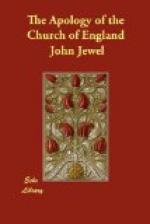chair, with his triple crown full of labels, with
sumptuous and Persian-like gorgeousness, with his
royal sceptre, with his diadem of gold, and glittering
with stones, was carried about, not upon palfrey,
but upon the shoulders of noble men. These things,
no doubt, did Peter at Rome in times past, and left
them in charge to his successors, as you would say,
from hand to hand; for these things be now-a-days
done at Rome by the popes, and be so done, as though
nothing else ought to be done. Or contrariwise,
peradventure they had rather say thus, that the Pope
doth now all the same things, which we know Peter
did many a day ago: that is, that he runneth up
and down into every country to preach the gospel,
not only openly abroad, but also privately from house
to house: that he is diligent, and applieth that
business in season and out of season, in due time and
out of due time: that he doth the part of an
evangelist, that he fulfilleth the work and ministry
of Christ, that he is the watchman of the House of
Israel, receiveth answers and words at God’s
mouth; and even as he receiveth them, so delivereth
them over to the people: that he is the salt of
the earth: that he is the light of the world:
that he doth not feed his own self, but his flock:
that he doth not entangle himself with the worldly
cares of this life: that he doth not use a sovereignty
over the Lord’s people: that he seeketh
not to have other men minister to him, but himself
rather to minister unto others: that he taketh
all bishops as his fellows and equals; that he is
subject to princes, as to persons sent from God:
that he giveth to Caesar that which is Caesar’s:
and that he, as the old bishops of Rome did without
any question, calleth the emperor his lord.
Unless, therefore, the popes do the like now-a-days,
and Peter did the things aforesaid, there is no cause
at all why they should glory so of Peter’s name,
and of his succession.
Much less cause have they to complain of our departing,
and to call us again to be fellows and friends with
them, and to believe as they believe. Men say,
that one Cobilon, a Lacedaemonian, when he was sent
ambassador to the king of the Persians to treat of
a league, and found by chance them of the court playing
at dice, he returned straightway home again, leaving
his message undone. And when he was asked why
he did slack to do the things which he had received
by public commission to do, he made answer, he thought
it should be a great reproach to his commonwealth
to make a league with dicers. But if we should
content ourselves to return to the Pope, and to his
popish errors, and to make a covenant not only with
dicers, but also with men far more ungracious and
wicked than any dicers be; besides that this should
be a great blot to our good name, it should also be
a very dangerous matter, both to kindle God’s
wrath against us, and to clog and condemn our own souls
for ever. For of very truth we have departed
from him, who we saw had blinded the whole world this




